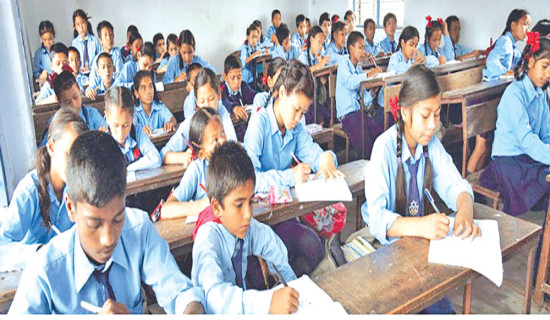- Sunday, 1 February 2026
Rise of voluntary childlessness poses a demographic challenge in Switzerland
Bern (Switzerland), July 1: In Nepali society, there is a general assumption that couples must have children after marriage. Due to societal pressure couples seek different medical treatments if they are unable to conceive naturally. Being childless or declaring that one doesn’t want children is very rare in Nepal. However, in another part of the world, Switzerland, the younger generation is increasingly choosing voluntary childlessness, sparking discussions about demographic challenges.
The desire among young people in Switzerland to remain childless (or child-free as some would call it) has grown significantly, prompting debates about the potential consequences of this decision. Some Swiss women are even expressing their intentions to be child-free as early as their teens.

One such woman is Celine Rohrer, a 27-year-old Swiss citizen who has been in a relationship with her partner for a decade. Celine made the decision not to have children when she was just 12 years old due to the fear of the physical changes pregnancy brings. Celine and her partner have firmly decided to prioritise living a fulfilling life rather than being consumed by family responsibilities.
Similarly, 33-year-old Jessica Thomet, who married a divorced man six years ago, has chosen not to have children as her husband already has two from his previous marriage. Jessica considers her pet dog as her child and believes that concerns about the declining population should not be a priority, given the global issue of overpopulation.
Elise Dottrens, a journalist in Switzerland, has also decided to remain childless due to concerns that becoming a mother would hinder her professional career. Two childless Swiss women with their pet in Bern, Switzerland.
Many Swiss women are now announcing their decision to be child-free. According to the 2018 Families and Generations Survey by the Federal Statistical Office of Switzerland, 24.8 per cent of men and 20.7 per cent of women between the ages of 50 and 80 have neither biological nor adopted children. Another survey conducted by the same office in 2018 revealed that 8 per cent of men and 9.7 per cent of women aged 20-29 do not want children, along with 17.4 per cent of men and 26.4 per cent of women aged 30-39, and 68.6 per cent of men and 88.5 per cent of women aged 40-49.
The latest data on the fertility rate indicates that Swiss women are more likely to choose voluntary childlessness compared to foreign-born women residing in Switzerland. The 2021 survey by the Federal Statistical Office shows that the overall fertility rate in Switzerland is 1.52. For Swiss women, it is only 1.42, whereas foreign-born women in Switzerland have a fertility rate of 1.78.
Stakeholders have initiated discussions on the implications of this trend in the future.
However, Celine and Jessica find solace in their decision to remain childless as they believe that Switzerland’s social security system provides ample
support for older individuals. With confidence in the country’s well-established benefits, they feel assured that paying taxes now will ensure a secure future in their old age.
Jessica blamed the government for promoting childbirth to increase future tax revenue. In response, a spokesperson for the Federal Social Insurance Office stated via email that while the birth rate does play a role in pension finances, it is not the sole determining factor due to dynamic changes caused by migration movements that impact cohort size beyond fertility and mortality rates.
Dr. Valerie-Anne Ryser, a senior researcher at the Swiss Centre for Expertise in Social Sciences (FORS), explained that women often chose to be childless due to strained relationships with their partners, a desire to pursue creative and personal endeavours, and even a sense of disillusionment with society. Concerns about climate change and ecological anxiety, such as water scarcity for future generations, also contribute to the decision.
 Journalist Dhakal at a conversation with Dr. Valerie-Anne Ryser, (right), a senior researcher at the Swiss Centre for Expertise in Social Sciences, in Switzerland.
Journalist Dhakal at a conversation with Dr. Valerie-Anne Ryser, (right), a senior researcher at the Swiss Centre for Expertise in Social Sciences, in Switzerland.
The strong perception of the overwhelming responsibility of parenthood in Swiss society has led some couples to remain childless. While the overall rate of women choosing not to have children is 20 per cent, it rises to 30 per cent among highly educated women. The researcher emphasizes that the various reasons for not having children are individual psychological perceptions specific to Swiss society. Additionally, Switzerland’s traditional family model, where women often work part-time and shoulder most of the childcare responsibilities, differs from other European countries and can discourage women from starting families.
Dr. Valerie-Anne suggests that the Swiss government should introduce schemes like parental leave if they genuinely aim to address the demographic challenges posed by voluntary childlessness.

Meanwhile, the government encourages respect for individual choices regarding family planning and refrains from passing judgment on this matter.
So, finding a balance between societal expectations and individual autonomy remains a complex issue in the context of evolving social dynamics and changing demographics.
(This story was made possible thanks to the swiss
program EQDA (Looking Beyond) which organises each year an exchange of
journalists between Switzerland and developing countries, with the support of
the Swiss Cooperation. The theme for 2023 is "Demography".)

.jpg)














